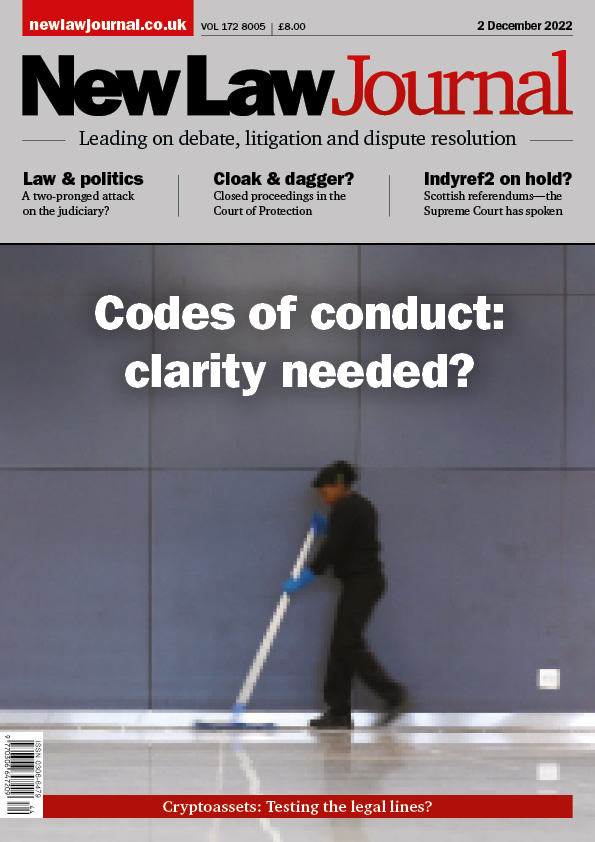THIS ISSUE

The cleaner did it! John Gould considers the rules & responsibilities which apply to non-solicitor employees of a firm
Andy Cullwick considers how law firms are facing up to an uncertain future, & how they can best adapt to it
David Jones & Evie Meleagros consider the progress & challenges of cryptoasset cases in the courts of England & Wales
Spying on your government is bad enough… but writing a book about it? Athelstane Aamodt explains why things are not always as they seem
Law firms have been warned again not to use litigation aimed at silencing critics—known as strategic lawsuits against public participation (SLAPPs).
A criminal offence of sharing ‘deepfakes’—explicit images or videos which have been manipulated to look like someone without their consent—is to be added to the Online Safety Bill, in a Ministry of Justice (MoJ) amendment.
An anonymous party known only as ‘Cøbra’ cannot take part in legal proceedings in England and Wales, the High Court has confirmed in a ground-breaking decision.
The Supreme Court’s decision regarding a draft Scottish Independence Referendum Bill will ‘not have come as a surprise’ to the first minister, according to public law specialist Stephen Parkinson.
The Lord Chief Justice, Lord Burnett, is to retire on 30 September 2023, after six years in post.
Ten firms out of 40 taking part in a Solicitors Regulation Authority (SRA) thematic review of immigration services providers have been referred to disciplinary processes after ‘significant shortcomings’ were found.
MOVERS & SHAKERS

Freeths—Ruth Clare
National real estate team bolstered by partner hire in Manchester

Farrer & Co—Claire Gordon
Partner appointed head of family team

mfg Solicitors—Neil Harrison
Firm strengthens agriculture and rural affairs team with partner return
NEWS
Conveyancing lawyers have enjoyed a rapid win after campaigning against UK Finance’s decision to charge for access to the Mortgage Lenders’ Handbook
The Crown Prosecution Service (CPS) has launched a recruitment drive for talented early career and more senior barristers and solicitors
Regulators differed in the clarity and consistency of their post-Mazur advice and guidance, according to an interim report by the Legal Services Board (LSB)
The Solicitors Act 1974 may still underpin legal regulation, but its age is increasingly showing. Writing in NLJ this week, Victoria Morrison-Hughes of the Association of Costs Lawyers argues that the Act is ‘out of step with modern consumer law’ and actively deters fairness
A Competition Appeal Tribunal (CAT) ruling has reopened debate on the availability of ‘user damages’ in competition claims. Writing in NLJ this week, Edward Nyman of Hausfeld explains how the CAT allowed Dr Liza Lovdahl Gormsen’s alternative damages case against Meta to proceed, rejecting arguments that such damages are barred in competition law









